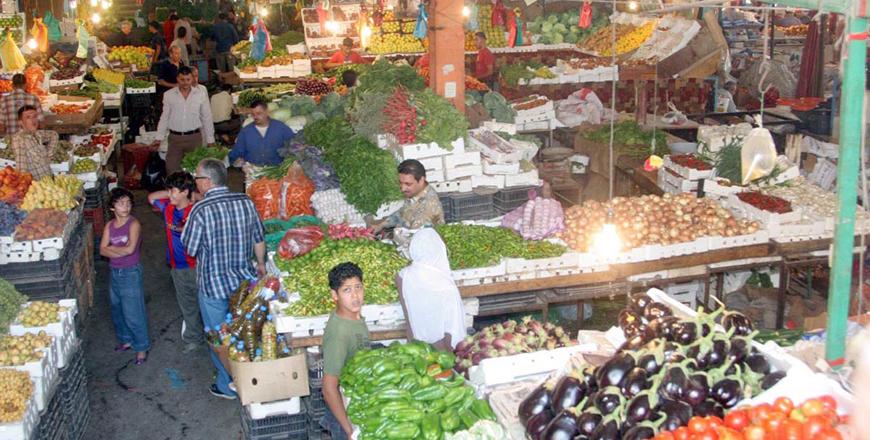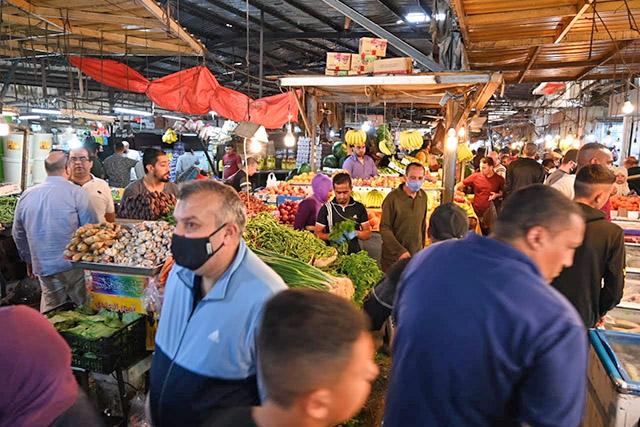You are here
Agriculture ministry gears up to implement strategic plan for sufficient supply during lockdown
By JT - Mar 21,2020 - Last updated at Mar 21,2020

The local production of vegetables and fruits covers the needs of the Kingdom, which is estimated at 2.5 million tonnes annually, according to Director of marketing and foreign trade at the Ministry of Agriculture Ayman Salti (JT file photo)
AMMAN — The Ministry of Agriculture has prepared a strategic plan to secure the Kingdom's demand for basic foodstuffs, both plant-based and animal-based, in response to measures to deal with the coronavirus outbreak and the expected difficulty of movement for agricultural sectors during the coming phase.
Director of marketing and foreign trade at the ministry Ayman Salti told the Jordan News Agency, Petra, on Saturday that through analysis of the ministry’s data regarding annual production, as well as demands during the coming period, it was found that "the situation is comfortable regarding these supplies”.
“They can cover long periods of no less than three months, and up to eight months in some sectors,” he said.
The Kingdom's standard demands for poultry are estimated at about 24,000 to 26,000 tonnes per month, of which about 25,000 tonnes are produced at local poultry farms, Salti said, noting that the ministry has instructedthe poultry sector to store quantities for emergencies in cooperation with the general union for poultry farmers.
He added that about 8,000 to 9,000 tonnes have been stored, in addition to the stored quantities of imported, cut and deboned poultry, which is sufficient for at least two months, with alternative flocks under production to continue covering the Kingdom's demands.
Regarding lamb meat, Salti said that the Kingdom’s needs are estimated at about 3,000 tonnes per month, up to 80 per cent of which is provided by local herds, adding that there are about 4 million sheep in the Kingdom, and more than one million goats.
He noted that supplementary quantities of live sheep are imported from countries including Australia, Romania and Hungary in quantities that allow the meat to be sold at reasonable prices. Certain quantities of chilled and frozen meat are also imported as a strategic stock.
Regarding the veal sector, Salti said that the ministry has implemented a similar policy to cover the Kingdom’s monthly needs, estimated at 2,330 tonnes, which are covered by the production of 20,000 locally raised cows, in addition to imported live cows in supplementary quantities to cover the needs of the local market.
He added that around 9,000 tonnes of chilled and frozen meat are imported annually.
Regarding dairy products, Salti said that the “essential” dairy products, including milk, labneh and white cheese, are covered by local production, with more than 480,000 tonnes of fresh milk available every year, a third of which is used to make yoghurt.
In regard to the Kingdom's olive oil stock, he noted that the 2020 season was “good” and saw the production of more than 30,000 tonnes. The Kingdom's annual demand for olive oil is estimated at 24,000 tonnes.
Salti said that the local production of vegetables and fruits covers the needs of the Kingdom, which is estimated at 2.5 million tonnes annually, with a surplus of around 550,000 tonnes that are exported to neighbouring countries.
He pointed to a deficit in some varieties of produce, such as lemons and garlic, which is covered by importing supplementary quantities outside their local production seasons.
Salti noted that the strategic stock of fodder in the Kingdom is “adequate”, with about 780 tonnes of yellow corn, 350,000 tonnes of soybeans and 720,000 tonnes of barley imported to cover demands.
Regarding veterinary medicines and chemical fertilisers, Salti said that local production covers most of the Kingdom's demands.
The Ministry of Agriculture has worked within the strategic plan to respond to the coronavirus crisis according to mechanisms that guarantee the sustainability of production, Petra reported.
Priority has been given to production management from farms and factories in order to preserve the availability of products during the epidemic.
The ministry has also prioritised preparing a storage plan for the holy month of Ramadan, Petra said.
Minister of Agriculture Ibrahim Shahadeh supervised the distribution of permits, according to the priorities that included the livestock sector, poultry, table eggs, hatchery eggs and livestock breeders, directly in the production locations.
The local product protection programme resulted in achieving self-sufficiency in a large number of crops and food products, such as onions, garlic, potatoes and chopped, frozen and chilled poultry, in addition to dairy products and red and white meat.
Related Articles
AMMAN — The Ministry of Agriculture on Monday advised consumers against excessive buying of food commodities ahead of the fasting month of R
The Agriculture Ministry and food traders on Saturday disagreed over recent restrictions imposed on imported frozen poultry.
AMMAN – The Ministry of Industry, Trade and Supply has ensured the availability of a wide range of goods at affordable prices, and has prepa




















